- Home
- Donald Hamilton
The Damagers Page 10
The Damagers Read online
Page 10
Mrs. Bell frowned. “Something else? What something else were you thinking of, Mr. Helm?”
I shrugged. “With Boomer Blum involved, the chances are good that we’re dealing with something explosive. You could stuff quite a big bang into that space.”
“Yes, that was our idea, too.” She frowned. “Would there be any problem getting it in and out of the engine room?”
“None whatever,” I said. “The boat is designed so you can replace the whole engine if necessary; just open the hatches and slide back the sunroof and hoist it right up through the deckhouse into the open air. If you haven’t got a crane, you can use the main halyard and its winch.”
“I see.”
I glanced at her. “There’s one more piece of information you can help me with, maybe, Mrs. Bell.”
“Yes?”
“What’s holding things up?”
“What do you mean?”
I said, “Lorelei III came up the ICW last spring. If something was hidden in her bilge, it was presumably taken off her then. Yet you people are still worrying about it some five months later, so apparently it hasn’t been used yet, whatever it is. Who’s waiting for what?” I looked at her face and sighed. “Okay, don’t tell me. I don’t need to know. Right?”
Mrs. Bell shook her head. “It’s not that. We simply don’t have the information. That is why we’re so interested in Fancher’s logbook; we hope that, if we can find it, it will give us an indication of where Lorelei III might have unloaded her secret cargo, which in turn will give us at least a hint of what target these fanatics have in mind… You’re absolutely certain the book is not on board?”
“Absolutely is a big word,” I said. “I’ll just say that the chances of its being on board are very small, and if it is on board it was probably reduced to a soggy, illegible mess when the cabin was flooded. But I’m not handing out any absolutelies, no, ma’am.”
“Fancher’s daughter says that he often kept the book by his bunk in his cabin—the aft cabin—when the boat was not underway.”
I said, “When I was drying things out, I had everything open that could be opened without a wrecking bar, including all the compartments in the aft cabin. If there’s anything hidden back there, it’s built into the woodwork or the fiberglass hull.”
“Hassim and Dorothy Fancher seem to believe it’s still on board, somewhere. That is presumably why they want the boat destroyed.”
I said, “Which brings up the question: why didn’t they sink it while they had it??”
Mrs. Bell said, “I think that’s readily explained: Mrs. Fancher had a dead husband on her hands. I suppose she considered giving him a Viking funeral, burning his boat with his body on board, but if anything went wrong and arson was suspected she’d also probably find herself accused of his murder. It was too big a gamble, so she reported the death to the authorities like a good wife— widow—and sent the boat home with a delivery crew, planning to attend to it later.”
I said, “Lori Fancher thinks she used a hired crew out of spite; but obviously she wouldn’t want the kid spending a week or two on board, if there was something incriminating there. And then, before she could do anything about the boat up in Oyster Bay, you started sending your agents around. Maybe that’s when she panicked and got hold of DAMAG and told them to deal with the situation, or got Hassim to hire them for her.”
Mrs. Bell said, “Let’s hope she and her terrorist lover are persistent and send yet another crew to do the job, DAMAG or Arab or whatever. But if you are to cope with them, I had better find somebody to help you sail this boat.”
I said, “It plays better with a woman, but it will work with a man. You’ve got the guy who was playing husband to the dame who was blackjacked to death, don’t you? I think he was calling himself Nathaniel Guild at the time.”
Mrs. Bell shook her head. “He’s really not much of a sailor; the woman had the nautical expertise on that team.”
“What about the real Siegelinda Kronquist? Has she recovered from her ordeal yet?”
Mrs. Bell shook her head. “She is still not well enough for our purpose. She wouldn’t do, anyway. I keep telling them in Washington that their screening methods are quite inadequate; Kronquist is a prime example. You can’t rely on girls like that; they’ll do anything, say anything, to save their pretty faces and avoid a little pain.”
I said, “What I want is somebody to relieve me at the helm and help with the dock lines; she doesn’t have to be a torture-proof heroine for that. She does know her way around a boat, doesn’t she?”
“Oh, yes, she’s a good sailor, but…”
“That’s all I need. If she’s ambulatory, send her along.”
Mrs. Bell’s eyes narrowed. “My dear man, don’t you start trying to tell me what to do; I can be just as temperamental as any government assassin.”
I grinned. “Okay, I apologize, very humbly. I’ll rephrase my suggestion: Dear Mrs. Bell, will you please be so kind as to send me the girl, I need somebody and I think she’ll do just fine. Pretty please?”
Mrs. Bell shook her head. “I really don’t think she’s suitable… Well, I’ll give it some thought. I’ll find you somebody. Is there anything else we should discuss?”
There wasn’t, and I accompanied her to the ladder, handed down her shoes and purse, and watched her step into her pumps and walk away up the dock, a competent adult lady who had a lot going for her, if you liked competent adult ladies.
11
An evening study session with the charts told me that I had a fairly long run to my next planned stop on the Chesapeake and Delaware Canal, so I rose at five next morning and was under way by six. Leaving the marina, I turned Lorelei III into the brief Cape May Canal, that lets you cut across the southern tip of New Jersey from the Atlantic Ocean to Delaware Bay, saving you a long, tough sail down around the cape and its outlying shoals.
I found that, while I kind of missed the company, and the competence, of my former girl navigators, I rather enjoyed handling the boat by myself for a change, although the weather had me slightly worried. It was another gray fall day, and the NOAA weather report had promised scattered showers and southerly winds in the fifteen-to-twenty-knot bracket, the same stiff breeze we’d bucked for almost two hundred miles coming down from Montauk; but on the northwesterly run up Delaware Bay it should be favorable, for a change. However, sailing by myself, inexperienced as I was, I would have preferred a bright sunny day and a flat calm.
Emerging from the short canal, after first slowing down to let a ferry of some kind turn into its dock near the entrance—I guess it runs across the mouth of the big bay, between New Jersey’s Cape May and Delaware’s Cape Henlopen—I headed out across the coastal flats, in some twenty feet of water, on a course that converged with the deep big-ship channel off to the west and would join it fifteen miles up the bay. On this hazy day, it was like taking off across an ocean; the distant Delaware shore was not visible.
With a brisk wind on the quarter, it would have been a good time to hang out some sails. Either of my departed female nautical experts would undoubtedly have been right out there pulling the strings, but I was busy enough getting the loran zeroed in on the next significant buoy up by something called Miah Maull Shoal, and the autopilot settled on the proper course; I didn’t need any flapping Dacron distractions. Besides, it had started to rain, and I was quite comfortable in the deckhouse and had no yearning whatever to get out into the weather and wrestle wet sails and haul on wet ropes—excuse me, lines. The big Ford diesel was doing just fine without wind assistance, thank you.
The seas picked up as we came out from the land, giving us a roller-coaster ride, and Nicky had to work hard to keep us headed in the right direction. An hour passed, the rain stopped, and I switched off the windshield wipers and relaxed a bit. It was beginning to look as if Delaware Bay wasn’t going to hit us with anything we couldn’t handle. I started thinking about setting a couple of sails after all, just to prove they didn’t i
ntimidate me…
“Lorelei III, Lorelei III, this is Bartender:’
It’s pretty standard to cruise along with the VHF radio on, tuned to channel sixteen, the emergency and contact channel; and it’s also pretty standard to ignore the constant gabble that comes out of the speaker—boatmen, not to mention boatwomen, seem to be lonely folks forever looking for somebody to talk to—until you hear your own boat’s name spoken. As a matter of fact, it took me a minute or two to wake up to the fact that somebody was calling me.
“Lorelei III this is Bartender. Come in, Lorelei III.”
I looked around, puzzled. There were a couple of big ships in sight moving along the hazy horizon to the west, following the deep channel over there; but I could see no boat nearby that could be calling.
“Come in, Lorelei III!”
I pried the microphone out of its bracket above the chart table. “Bartender, this is Lorelei III.”
“Switch to seven-two.”
Once you’ve made contact, you’re supposed to get off sixteen and do your talking on one of the other channels. If you don’t, the Coast Guard will break in and scold you for tying up the emergency and calling circuits.
I said, very nautical, “Seven-two, aye aye.”
Channel sixteen comes on automatically when you turn on the VHF, but it took me a minute or two to remember what buttons to push and knobs to twist to change the red sixteen glowing in the little window to seventy-two. By the time I had the proper channel tuned in, the other boat was already calling me on it, impatiently.
“Come in, Lorelei III.”
I picked up the mike I’d put down. “This is Lorelei III.”
“Cap’n, I have a crew member here missed you at the marina, you took off so early.” Out on the water, everybody calls everybody “captain,” particularly over the air. “She hired my boat to bring her out to you.”
Apparently Mrs. Bell had found somebody to send me sooner than she’d expected—well, if I took the message at face value. I wondered if, assuming it was genuine, she’d decided to use the Ziggy Kronquist, after all.
“Where are you, Bartender?” I asked.
“Two-three miles astern of you. Got you in sight, I think, cap’n. White ketch with a pilothouse east of Brandywine Shoal?”
“Affirmative,” I said.
“If you just come back on a reverse course slow and easy I’ll bring the lady right out to you.”
I hated to turn around and lose time and miles backtracking, but I didn’t have a choice. If the still-unidentified female really was my crew of the day, or week, or month—I hoped she’d at least last a little longer than the previous two—I could use the help; and if she wasn’t, if perhaps she didn’t even exist and the whole thing was a trap, well, that was why I was out there, doing my stupid-sailor routine so traps could be sprung on me. Wasn’t it?
I said, “Roger, captain. Come alongside to port when you get here, she can board a little easier from that side.”
I sounded salty as hell, I thought, maybe a little too salty for the nautical stumblebum I was supposed to be. Bartender acknowledged the instructions and signed off—Bartender, for God’s sake! I’ve given up trying to figure out how they pick their boat names. Of course the real reason I preferred to have him make his approach to port was that that was the side on which the gun brackets were located. I took over the helm from Nicky and sent us back toward Cape May. Heading more or less into the wind made things considerably rougher and wetter on board, even at reduced speed.
I set the autopilot again and went below to get out the two weapons I’d used the other night, bringing them up to the deckhouse. Before stowing away the rifle, earlier, I’d replaced the laser sight—that might have made the Coast Guard curious—with a standard 3x—9x9 variable telescopic sight that had raised no eyebrows. Now I set it to 3x, since you can’t use much magnification shooting from an erratically moving boat. I loaded the rifle fully, checked the safety, and clipped the weapon into place. I loaded the magazine and chamber of the shotgun and snapped it into its clips beside the rifle, again with the safety on, not that I have implicit faith in safeties. A safety will do its job practically all of the time—but it’s that “practically” that can kill you.
Having prepared the heavy artillery, I checked the smaller stuff I had hidden around the boat in various places the Coastie snoops had missed. After all, I’d had two months to work on the problem, and the places where you hide weapons aren’t the kind of places they’d been looking for, the kind where you hide drugs—a space that can hide a folding knife, or even a .25 automatic, won’t hold enough happy-dust to make anybody rich. Then I returned to the deckhouse, bracing myself against the boat’s pitching. Nicky was having an easier time holding course since we were going to windward, but Lorelei III was making wet work of the short, steep Delaware Bay chop.
I started the windshield wipers again, but I couldn’t spot an approaching boat through the glass, and of course there didn’t have to be one. Somebody could be calling me from a distant helicopter, setting me up for a minisub small enough to operate submerged in these shallow seas; a homing minitorpedo could be heading my way any minute. But I wasn’t really expecting such an elaborate sci-fi attack. So far, DAMAG had sent against me one pretty lady with a knife, and one souped-up sport boat with some grenades; young Caselius didn’t seem to favor very far-out techniques, where homicide was concerned.
I uncased the ship’s big binoculars—7 x 50s, if it matters—and stepped up into the port doorway to scan the bay ahead more carefully, and there it was: a husky outboard craft about twenty-five feet in length heading straight at me—well, as straight as the seas allowed. Actually, it would yaw widely on occasion as it surmounted one of the larger waves, letting me see that it was white with a blue stripe, and had no cabin, just a steering console in the center of the big cockpit. There were fishing rods in various holders, and two big motors on the stern. Having handled a boat somewhat like it once or twice in the past, I could appreciate the skilful job the helmsman was doing, surfing along with the steep chop; but he’d have a slow rough ride pounding back to Cape May against the wind after making his delivery.
Looking up from the binoculars, I realized that we had another squall approaching fast. For a few minutes, I thought Bartender would reach us first; but when the outboard was a hundred yards away it disappeared behind a gray curtain of rain. Moments later we were also in the soup, flying blind. I closed the deckhouse doors against the stuff blowing in and thought, as I had before on this mission, that this was a hell of a spot for an innocent boy from the Great American Desert. Lightning lit up the murk momentarily; the sound effects followed loudly.
Bartender appeared out of the pouring rain, dead ahead. I pulled Lorelei III’s throttle back to idling speed, just enough power to allow Nicky to hold the course. I stepped over to port and opened the deckhouse door and the boarding gate, as the outboard swung around and came alongside. It was wet out on deck. I stood ready to reach back down for the shotgun if necessary, but all that happened was that a very wet woman in white slacks and shirt picked up a dusty-pink suitcase in one hand and a ducky little matching dusty-pink cosmetics kit, or whatever, in the other, and moved to the rail.
A suitcase, for God’s sake! Even I knew that nobody with any sailing experience brings a suitcase onto a boat, because there’s never any place to stow the bulky thing— that’s why duffel bags were invented. I wondered where the hell Mrs. Bell had found this female landlubber, and why she’d bothered to send her to me. Of course the dame didn’t have to have come from Mrs. Bell. The phony Ziggy Kronquist hadn’t.
After seeing the impractical luggage, I wasn’t a bit surprised at the high-heeled white pumps. In spite of them, the woman managed the crossing in reasonably agile fashion, with some help from me, after passing her bags over first. She dove for the shelter of the deckhouse without thanking me for my assistance. Bartender’s skipper gave me a farewell salute and gunned his big outboard motors
. I noticed that they were Yamahas, a hundred and fifty horsepower each, which sounds like a lot but is actually rather conservative by today’s standards.
As I joined her in the deckhouse, the woman said, “My bags! They’re getting all wet out there on the deck!”
I said, “So haul them inside and close the door. I’ve got to get this train back on track.”
I stepped over to the steering console, flipped Nicky’s switch to off, spun the wheel, and brought us back to the northwesterly course the loran said would bring us to the buoy up by Miah Maull Shoal. I reset the autopilot and turned to face my dripping new crew, if that was what she was. Even if she was, I had the distinct impression that, unlike her predecessor, this one wasn’t really committed to feeding me well and keeping me happy.
She was a slender female in her late twenties or early thirties… Correction. The waist was slender, but what was above and below it wasn’t. She was actually a rather voluptuous dame, looking more so in her drenched clothes. The trouble with taking the modern feminine styles to sea is that they may look fashionable dry, but they look totally ridiculous wet. A gal in snug wet jeans is just a gal in snug wet jeans; but a female in the voluminous shorts currently in vogue looks pretty silly with all that loose stuff plastered to her, as Lori had demonstrated; and a dame in a pair of the baggy pleated slacks that look terrifically smart in Vogue becomes a real clown after being doused with rain and sea-water.

 The Two-Shoot Gun
The Two-Shoot Gun Mad River
Mad River Texas Fever
Texas Fever Ambush at Blanco Canyon
Ambush at Blanco Canyon The Big Country
The Big Country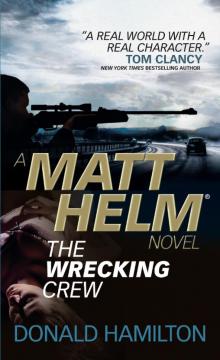 The Wrecking Crew
The Wrecking Crew The Devastators mh-9
The Devastators mh-9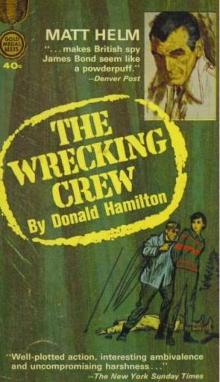 The Wrecking Crew mh-2
The Wrecking Crew mh-2 The Shadowers mh-7
The Shadowers mh-7 The Ambushers mh-6
The Ambushers mh-6 The Betrayers
The Betrayers The Terrorizers
The Terrorizers The Poisoners
The Poisoners The Devastators
The Devastators The Silencers mh-5
The Silencers mh-5 The Interlopers mh-12
The Interlopers mh-12 The Shadowers
The Shadowers The Annihilators
The Annihilators The Vanishers
The Vanishers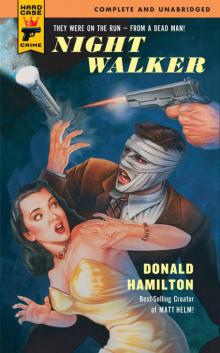 Night Walker
Night Walker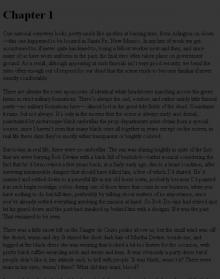 The Revengers
The Revengers The Frighteners
The Frighteners The Infiltrators
The Infiltrators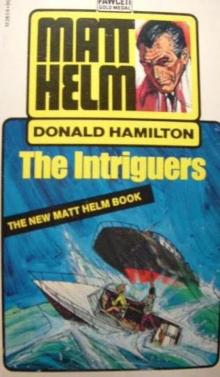 The Intriguers mh-14
The Intriguers mh-14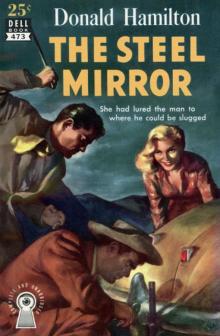 The Steel Mirror
The Steel Mirror The Menacers
The Menacers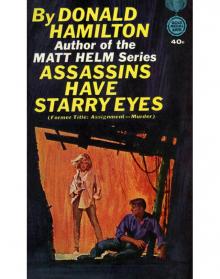 Assassins Have Starry Eyes
Assassins Have Starry Eyes Death of a Citizen
Death of a Citizen Matt Helm--The Interlopers
Matt Helm--The Interlopers The Removers mh-3
The Removers mh-3 The Demolishers
The Demolishers Murder Twice Told
Murder Twice Told The Poisoners mh-13
The Poisoners mh-13 The Ambushers
The Ambushers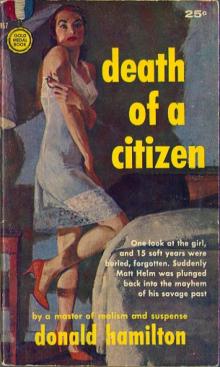 Death of a Citizen mh-1
Death of a Citizen mh-1 The Silencers
The Silencers The Removers
The Removers The Intimidators
The Intimidators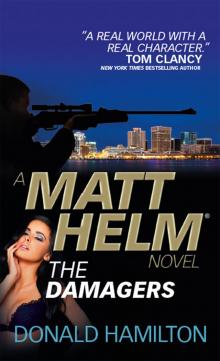 The Damagers
The Damagers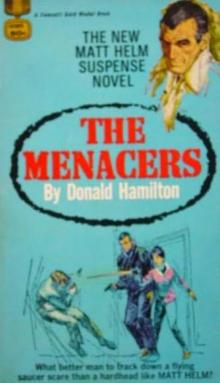 The Menacers mh-11
The Menacers mh-11 The Retaliators
The Retaliators Murderers' Row
Murderers' Row The Ravagers
The Ravagers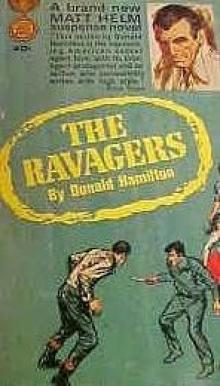 The Ravagers mh-8
The Ravagers mh-8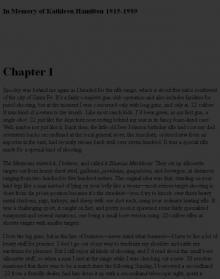 The Threateners
The Threateners The Betrayers mh-10
The Betrayers mh-10